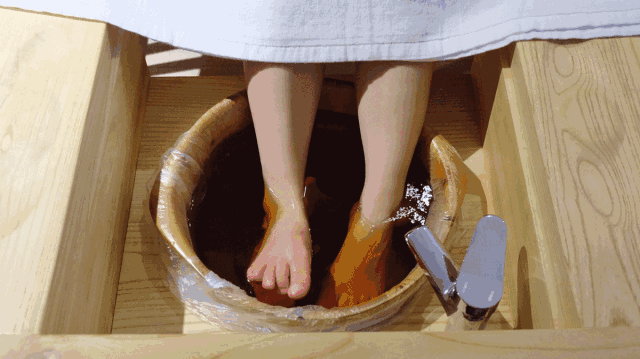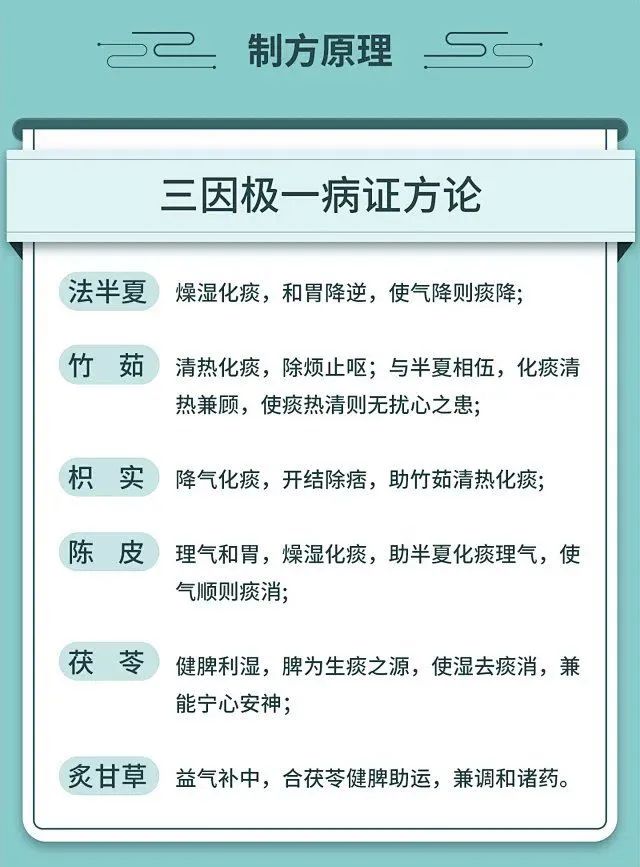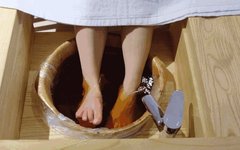Today, I would like to share an ancient formula known as the “First Formula for Eliminating Phlegm and Dampness,” which sweeps away all phlegm and dampness from the body, helping you stay away from three highs, obesity, and insomnia. Let’s take a closer look!
Commonly referred to as the “three highs,” these include high blood sugar, high blood lipids, and high blood pressure. Ultimately, these conditions stem from an excess of phlegm and dampness in the body. Some people often suffer from insomnia, tossing and turning at night due to an unsettled mind. Others struggle to lose weight, also due to excessive phlegm and dampness, which causes fluid retention in the body. If you know how to eliminate phlegm and dampness, many ailments can be resolved.
Wen Dan Tang (Warm Gallbladder Decoction) is truly a miraculous remedy.
What exactly is Wen Dan Tang?
It’s quite simple: Fu Ling (Poria) 30g, Ban Xia (Pinellia) 6g, Zhi Shi (Bitter Orange) 6g, Zhi Gan Cao (Honey-Fried Licorice) 6g, Chen Pi (Dried Tangerine Peel) 6g, Zhu Ru (Bamboo Shavings) 6g.
These six ingredients are all common herbs, none of which are particularly precious. However, when combined, they can produce miraculous effects.
Clinical practice has shown that Wen Dan Tang can treat over 100 different conditions. Some unusual ailments can also be treated with Wen Dan Tang. However, it cannot be said that Wen Dan Tang cures all diseases; rather, many ailments are caused by phlegm and dampness, and Wen Dan Tang specifically addresses these issues. By treating phlegm and dampness, it also resolves various related symptoms.
Traditional Chinese Medicine emphasizes targeted treatment. Once the underlying pathology is identified, the treatment direction becomes clear. Phlegm-dampness constitution can be treated with Wen Dan Tang.
It is important to note that the term “phlegm” here does not refer to the common understanding of phlegm, but rather to the pathological accumulation of body fluids; “dampness” refers to the dysfunction of the digestive system, leading to uncontrolled fluid movement within the body, resulting in the formation of internal dampness.
In simple terms, phlegm and dampness refer to an accumulation of excess fluids in the body that cannot be metabolized normally.
Modern lifestyles often contribute to poor habits, such as consuming cold drinks and ice beer, relying on air conditioning and fans, and staying up late. These habits lead to a prevalence of phlegm-dampness constitution among many people, resulting in various health issues.
Traditional Chinese Medicine has summarized many characteristics of phlegm-dampness constitution:
Based on years of practical experience and feedback from numerous individuals who have used Wen Dan Tang, the following characteristics are typical of those who would benefit from this formula:

➤1 Tongue Appearance: The tongue is enlarged, with a white greasy or yellow greasy coating (damp-heat), and may have teeth marks or red spots.
➤2 Bowel Movements: Frequent, unformed stools that stick to the toilet; frequent urination with clear, watery urine, and may wake at night; or dark yellow urine.
➤3 Facial Diagnosis: Dull yellow complexion, prone to acne, especially pustular acne, with slightly swollen eyelids.
➤4 Body Type: Abdominal fullness and softness, or a generally overweight appearance.
➤5: A sticky, unpleasant taste in the mouth, with excessive phlegm;
➤6: Dry mouth, bitter taste, and bad breath.
➤7: Rarely feeling thirsty and not wanting to drink water;
➤8: Prone to sweating, with a strong odor, and skin feels cool after sweating;
➤9: The body, especially the calves, feels heavy and weak, with persistent fatigue, feeling tired no matter how much sleep is obtained.
➤10: Cold hands and feet, chest tightness, and joints easily ache or feel numb;
➤11: Gastrointestinal discomfort: prone to bloating, stomach pain, diarrhea, constipation, etc.
➤12: Tinnitus is common.
➤13: Prone to feelings of tension, depression, anxiety, and anger.
➤14: Frequent sleep disturbances (not due to psychological stress or emotional stimuli).
If you have at least two of the above symptoms, it indicates that your body has excessive dampness or damp-heat that needs to be eliminated. You can use Wen Dan Tang foot baths to dispel dampness and phlegm or clear damp-heat. If you have more than five symptoms, it suggests that your internal dampness or damp-heat is quite severe. It is not necessary to have all 14 symptoms to require treatment for dampness and phlegm or to clear damp-heat.
“Phlegm and dampness cause strange diseases”; “Phlegm is the mother of all diseases”; “Dampness is the root of all evil.” Many inexplicable ailments are actually caused by phlegm and dampness. Wen Dan Tang can treat phlegm and dampness, so using Wen Dan Tang for foot baths can address many health issues.
In Dr. Luo Dalun’s book, “Tongue Diagnosis,” the formula for Wen Dan Tang is disclosed:
Wen Dan Tang: Fu Ling (Poria) 30g, Ban Xia (Pinellia) 6g, Zhi Shi (Bitter Orange) 6g, Zhi Gan Cao (Honey-Fried Licorice) 6g, Chen Pi (Dried Tangerine Peel) 6g, Zhu Ru (Bamboo Shavings) 6g.
The main functions of Wen Dan Tang are to eliminate dampness, transform phlegm, and relieve greasiness. The monarch herb in this formula is Fu Ling, which strengthens the spleen and promotes dampness elimination; a healthy spleen leads to phlegm resolution (“the spleen is the source of phlegm”), and promoting dampness leads to its removal.

Dr. Luo Dalun also introduced the method for using Wen Dan Tang for foot baths: Boil the above herbs in water, bring to a boil over high heat, then simmer for 30 minutes, strain the herbal decoction, and divide it into two portions. In the morning and evening, mix with warm water for foot baths, ensuring the water is not too hot, just covering the tops of the feet, and soak for about 25 minutes.
Wen Dan Tang is generally used for foot baths. It is not that the formula cannot be ingested, but the effects are better when used for foot baths.Because individuals with heavy phlegm and dampness often have spleen deficiency, absorption is poor. The rich meridians in the soles of the feet allow for better absorption of the herbs, leading to quicker results.The herbs for Wen Dan Tang can generally be purchased at herbal shops. (It is not recommended to buy online, as the quality of herbs cannot be guaranteed.)
►Wen Dan Tang can also help with: including athlete’s foot, insomnia, dysmenorrhea, eczema, rhinitis, psoriasis, tic disorders, cholecystitis, schizophrenia, stubborn cough, hair loss, and many other conditions, achieving good results in clinical practice.
1. Symptoms of Phlegm-Dampness: The body is overweight, limbs are swollen, oily skin, dull complexion, greasy tongue coating, cold hands and feet, excessive sleepiness, frequent bowel movements, chest tightness, easy sweating, joint pain, and excessive phlegm.
2. Symptoms of Damp-Heat: Frequent unformed stools, loose or even constipated, thick greasy tongue coating, serrated edges on the tongue; fatigue and weakness, drowsiness; sensitivity to both cold and heat; dry mouth, bitter taste, bad breath; excessive phlegm, cough; oily hair, hair loss; swelling, drooping eye bags; lower back and joint pain; chest tightness; dark circles; dizziness and lack of energy; dampness in the genital area; dampness in the scrotum; facial blemishes, acne, oily skin; abnormal vaginal discharge with odor, itching; oily skin, eczema, etc.
3. Symptoms of Cold-Dampness: Pale, bluish, dark, or black complexion; prone to recurrent oral ulcers, coughing up thin white phlegm; runny nose, cold sweat, frequent sneezing (especially in the morning, sneezing continuously when exposed to wind); prone to abdominal pain and diarrhea; facial blemishes and acne, etc. (Wen Dan Tang can be used with ginger for foot baths.)
Finally, who is most suitable for Wen Dan Tang:Those with phlegm-dampness, damp-heat, cold-dampness, or qi stagnation are all suitable:1. Those with poor sleep (liver and gallbladder disharmony, especially those with phlegm in the body, feel it more during seasonal changes).2. Those who are overweight due to dampness (phlegm-dampness individuals appear plump and soft in the abdomen, with a bloated and heavy appearance, gaining weight easily).3. Those with a short temper (Wen Dan Tang clears liver and gallbladder heat. After soaking the feet, massaging the Tai Chong point will enhance the effect).4. Those with liver qi stagnation, who often feel low (Wen Dan Tang warms yang, promotes qi, and invigorates blood; soaking until slightly sweating, and persisting for a while can improve mood and gradually uplift spirits); those who are easily tense, anxious, depressed, angry, or timid.5. Those with a yellow greasy tongue (a yellow tongue indicates heat, and the thicker the coating, the heavier the dampness) / a white greasy tongue indicates cold-dampness.6. Those with oily faces and acne; prone to sweating with an odor, feeling cool after sweating. Those with heat above and cold below.7. Those with three highs (phlegm-dampness individuals have thick, sticky blood; good diet but little exercise, making it essential for those with three highs). Note: Hypertensive patients are advised to consult a physician before use.8. Lazy individuals who enjoy sweet foods and prefer to lie down after meals.9. Those with frequent indigestion, belching, and sour stomach, and bad breath.
10. Those with nodules or lipomas.
Precautions:1. The water level for foot baths should be suitable for the San Yin Jiao point.2. The water temperature should be within a comfortable range; slightly higher temperatures yield better results.3. Soaking time should be over 20 minutes; considering the water cools quickly, you can reserve some water to add during the soak to maintain temperature.4. The container for decocting the herbs should preferably be porcelain; stainless steel or aluminum pots can be used, but avoid iron pots.5. A single batch of herbs can be decocted twice. If possible, soak twice a day; if not, once a day is sufficient.6. If you experience gas, belching, or flatulence after soaking, these are signs of the body expelling toxins, which is a good sign.7. How many days is appropriate for soaking? Generally, it is recommended to use the herbs for 7 doses, and foot baths should last at least 10 days, but this depends on individual feelings. Since the goal is to eliminate phlegm and dampness, it is advisable to avoid foods that are sticky and generate phlegm and dampness during the soaking period. Cold and raw foods should also be avoided.Precautions for Foot Bath Users:1. Because the formula contains Zhi Shi (Bitter Orange), which breaks qi, pregnant women should not use this formula.2. This formula has a descending qi effect, so it is not recommended for those with severe qi deficiency. If you experience symptoms of qi deficiency during the soak, you can take Shen Mai Yin or Bu Zhong Yi Qi Wan to boost qi.3. Diabetic patients should be cautious as they may have numbness in their feet and be insensitive to water temperature; they can also soak after carefully adjusting the temperature.4. Children under six years old are not recommended to use this formula for foot baths.
Aside from these groups, others can use foot baths. It is permissible during menstruation or when having a cold; you can prepare a large pot of water for the whole family to soak together.
If you also belong to the phlegm-dampness constitution, consider trying it for conditioning, but it should only be used under the guidance of a qualified physician.

